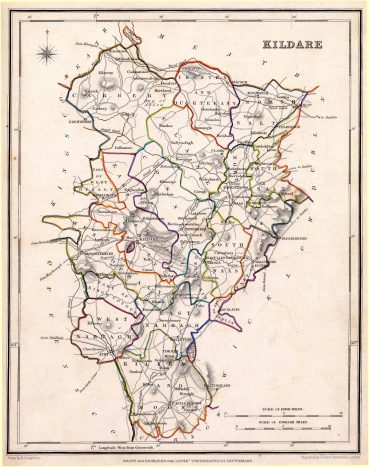Kildare County Council’s County Archives Service has digitised over 6,000 pages of the surviving County Kildare Grand Jury abstracts of presentments and query books and these are now available to researchers via its online archives service at Online Archives
The digitisation of the Grand Jury archives will improve public access, facilitate research and create an additional preservation copy.
Kildare County Council acknowledges the support of the County Kildare Decade of Commemorations Committee and the Department of Tourism, Culture, Arts, Gaeltacht, Sport and Media under the Decade of Centenaries 2012-23 initiative for funding to conserve the 1810-1826 manuscript volume before its digitisation.
These records are the earliest local authority archival collection for Kildare. The Grand Jury dates from medieval times when its main function was the administration of justice. In the eighteenth and nineteenth centuries it took on more functions such as the provision of roads and public buildings, and the running and maintaining of dispensaries, courts, fever hospitals, the county infirmary, and the county gaol. The Grand Jury also collected a tax called the county cess. The Valuation Acts of 1826 and 1852 made the valuation more equitable and from 1833 ratepayers were represented at the baronial presentment sessions. The Grand Jury was made up of prominent local landowners who were appointed by the sheriff. It met twice yearly at the spring and summer assizes for the purpose of passing presentments of proposed and approved works which were effectively financed by the cess payer.
The post of the county surveyor was first created in the nineteenth century, which also reported to the assizes. However, corrupt practices amongst the grand juries were widespread, and in 1899 their powers and duties were transferred primarily to democratically elected county councils, as well as to rural district councils under the Local Government (Ireland) Act of 1898.
‘We present Mary Nowlan, wife of Darby Nowlan of Nurney in said County, as a proper person to be instructed in the practise of midwifery, her residence being seven miles distant from the nearest practicing physician, or gentleman following the profession of midwifery, and fourteen miles from Naas, the site of the intended infirmary’.
(Summer Assizes, 1809)
The digitised printed books have had Optical Character Recognition (OCR) software applied to facilitate text searching. The volume covering the years 1810-1826 is handwritten, so OCR cannot be applied. Due to the age and condition of the documents the OCR process is not fully accurate. Please also note that spelling of words may vary from modern usage.



